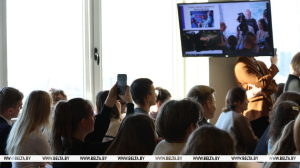Ru
|
Eng
Cosmonaut shares impressions from outer space with Belarusian State University students
30.03.2024

MINSK, 30 March (BelTA) – A communication session with the International Space Station took place at the Belarusian State University (BSU) on 29 March. During the communication session the Belarusian cosmonaut Marina Vasilevskaya talked to the students, BelTA has learned.
As expected, Marina Vasilevskaya made contact at 17:50 Minsk time. About 80 BSU students came to talk to her.
Before communication was established, BSU Rector Andrei Korol said he was glad the session would take place at the university. “It is a significant historical event for our country,” he said. “Our university has its own tradition of designing satellites. This is why it is quite natural that this kind of communication is possible using the well-prepared infrastructure of space education labs.”
Subdepartment Head at the Radio Physics and Computer Technologies Department Vladimir Sayechnikov said that they had two frequencies open in order to prevent any unexpected situations. “We already had experience of such communication sessions. We also organized communication in 2013,” he said.
The students asked Marina Vasilevskaya various questions. Was it difficult to train? What experiments are held in orbit? What R&D products are used? How did Marina Vasilevskaya feel during the flight? One of the students wondered whether the cosmonaut’s perception of outer space had changed. Marina Vasilevskaya responded by saying: “Outer space is unbelievable. I had expected the very best from this place, from the International Space Station, from Earth, and from what I saw. But everything turned out even better and more beautiful than my expectations.”
The students also asked what Marina Vasilevskaya was feeling about the postponed launch. In her words, she was calm and confident. Later on she was even glad that the flight lasted for two days. “When we were flying, the spacecraft was constantly moving. It was unbelievably beautiful. You can fly around Earth and see it from all sides,” she said.
She also noted her experience as a flight attendant had been useful. “I worked as a flight attendant and I was prepared for gravitational stress and emergencies. This is why it was a bit easier for me to train before the flight,” Marina Vasilevskaya said.
The students also wondered whether cosmonauts get any days off. According to Marina Vasilevskaya, they certainly do but when one is on board the ISS, one always wants to study something and observe. The cosmonaut is supposed to carry out seven research projects: five for scientific purposes and two for general education.
One of the students Ivan Kurakov said that talking to the cosmonaut had been unbelievable experience for him. “I am glad that in our country ordinary university students can be part of history and ask questions from a cosmonaut. It seems to me it will help us develop science in the future,” he said.
SCIENCE. TECHNOLOGY. INNOVATIONS
13.08.2024
28.06.2024
28.06.2024
25.06.2024
05.06.2024
15.05.2024
15.05.2024
26.04.2024
26.04.2024
26.04.2024













